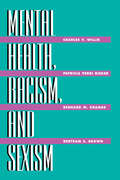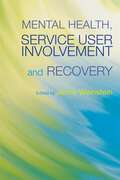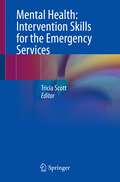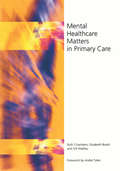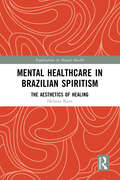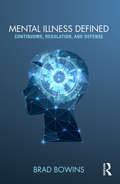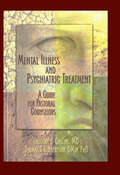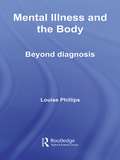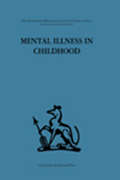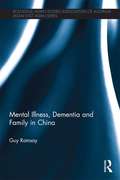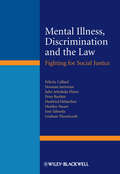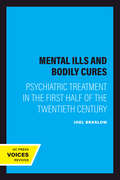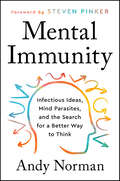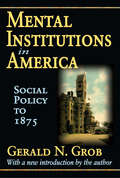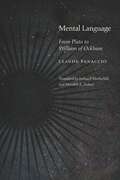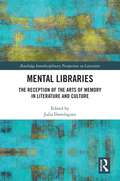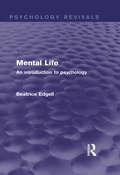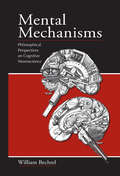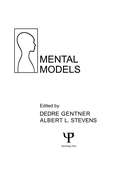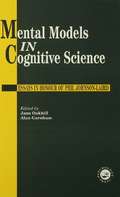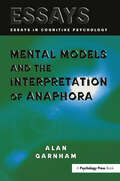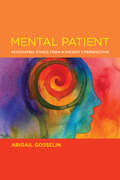- Table View
- List View
Mental Health, Racism And Sexism
by Charles V. Willie Patricia Perri Rieker Bernard M. Kramer Bertram S. BrownFollowing their book "Racism and Mental Health", the authors here re-examine the intersections of racism and mental health, adding sexism as another divisive issue that profoundly affects mental health. The book aims to offer fresh perspectives on contemporary controversial issues, including: interracial adoptions, teenage motherhood, gender bias in mental health diagnosis and therapy, prisons used as substitutes for hospitals, homeless families, and increasing violence in the home and on the streets.
Mental Health, Service User Involvement and Recovery
by Jenny WeinsteinAs the momentum for personalisation and recovery approaches grows, service users are increasingly participating as partners in all aspects of health and social care delivery, policy-making and professional training. This book provides an overview of service user involvement in mental health, its origins and current practice and policy. Written cooperatively by service users and academics, this book conveys a vital connection between recovery and involvement, offering a framework of values and helpful strategies to promote meaningful user participation. By sharing their personal narratives and contributing their views, service user authors demonstrate how taking control of their own care facilitates a swifter and more satisfying recovery. The book further acknowledges the bilateral value of user involvement in the development of mental health services, student learning, collaborative research and challenging social stigma, providing examples and critical appraisal of how this is currently being implemented. With a strong, positive emphasis on the benefits to all stakeholders, Service User Involvement and Recovery in Mental Health offers guidelines for good practice that will be relevant to health and social care practitioners, service users, students, researchers and educators.
Mental Health: Culture, Race and Ethnicity
by US Department of Health and Human ServicesA supplement to Mental Health: A Report of the Surgeon General. Cross-cultural comparisons of blacks, North American Indians, Asian-Americans, Hispanic Americans, and whites.
Mental Health: Intervention Skills for the Emergency Services
by Tricia ScottThis book addresses the practical management of mental health scenarios in the emergency setting and offers first-hand reflections on how emergency nurses, practitioners and allied mental health professionals handle these situations. Responding to mental health needs in emergency situations can be profoundly complex. Frequently emergency nurses and other personnel express their feelings of powerlessness, as they do not know what to say or do in order to achieve the best outcome, and have concerns that their intervention may make the situation worse for those in their care. How a practitioner confronts the mental health encounter and takes the essential steps in managing the event can have a critical impact on how that person copes in the future. This book helps readers understand what is involved in mental health work in emergency situations, and the practical, psychosocial and spiritual tensions that arise from managing the event and the sequelae. Moreover, it shows that it may be possible to provide a more effective emergency mental health service.This unique edited book presents critical reflections on aspects of mental health work gathered from the ‘hands-on’ experiences of the personnel. Mental health encounters in the emergency context are described in detail, illustrating not only what emergency nurses and mental health workers ‘do’ when mental health crises occur, but also what they feel about what they ‘do’. Written by a diverse team of emergency and mental health nurses and allied professionals currently engaged in emergency care both in hospital and pre-hospital settings, this book will appeal to emergency nurses and allied health professionals alike.
Mental Healthcare Matters In Primary Care
by Ruth Chambers Gill Wakley Elizabeth BoathThe National Service Framework for mental health aims to provide uniformly good systems so that mental health problems are detected and therefore treated early. This book sets out how learning more about mental health and reviewing current practice can be incorporated into a personal development plan, or practice learning plan. It shows how to integrate quality improvements into everyday work, and bridges the gap between theory and practice. Doctors, nurses and practice managers can build up a personal development plan, or a practice professional development plan through completing the exercises at the end of each chapter, and it demonstrates how to include clinical governance in the mental healthcare services they offer.
Mental Healthcare in Brazilian Spiritism: The Aesthetics of Healing (ISSN)
by Helmar KurzThis volume addresses the diversification of mental healthcare provision and patients’ health-seeking behavior by putting Brazilian Spiritism and its translocal relations at the center of its inquiry.Comparative chapters document and critically assess the affective arrangements of Spiritist spaces in Brazil and Germany and how practices contribute to healing and the diversification of a globally circulating mental health agenda. The book addresses the human experience within Spiritist psychiatric clinics and affiliated Spiritist centers in Brazil, which in migratory contexts also have connections to Germany. Chapters interrogate the spaces where people inside and outside Brazil engage in implementing Spiritist practices in mental healthcare, introducing the Aesthetics of Healing as a conceptual tool to understand interactions between religion and medicine more broadly.Establishing a novel analytical and interdisciplinary perspective on embodied aspects of sensory experience and perception, this compelling volume will be of interest to scholars, researchers, and postgraduate students involved with mental health research, medical anthropology, Spiritualism, and cross-cultural psychology. Practitioners in the fields of transcultural psychiatry and the sociology of religion will also find the volume of use.
Mental Hygiene and Psychiatry in Modern Britain
by Jonathan TomsThrough an examination that uses previously unavailable archives and little-used primary literature, this book places the twentieth-century mental hygiene movement within the broad sweep of modern British psychiatry, offering its own reinterpretation of important elements of this history.
Mental Illness Defined: Continuums, Regulation, and Defense
by Brad BowinsUnderstanding the true nature of mental illness is essential for interpreting disparate research results, establishing accurate diagnostic profiles, setting robust research agendas, and optimizing therapeutic interventions. Psychopathology currently lacks a unifying framework. Mental Illness Defined: Continuums, Regulation, and Defense provides such a framework by filling the knowledge gap. Continuums, as opposed to numerous discrete entities, characterize mental illness. Impaired regulation fosters extreme expressions of mental illness continuums, an occurrence that can be compensated for by "cognitive regulatory control therapies." Defenses tend to moderate behavior, although excessive levels foster dysfunction, as with personality disorders. The model presented aligns with neuroscience and other relevant data, thereby placing psychopathology on a more scientific foundation to advance the aims of both researchers and treatment providers.
Mental Illness and Psychiatric Treatment: A Guide for Pastoral Counselors
by Harold G Koenig Gregory Collins Rev Thomas CulbertsonTake your rightful place on the holistic health care team, with the goal of restoring vitality of body, mind, and spirit to people suffering from emotional illness! This book is designed to bring essential knowledge and skills to the religious professional who seeks to provide special ministry to the emotionally troubled. It provides a basic understanding of psychiatric illnesses, theory, and treatment modalities that is certain to enlarge the perspective of the pastoral worker. In addition to an essential overview of psychiatry in general, Mental Illness and Psychiatric Treatment: A Guide for Pastoral Counselors will help you to better serve people suffering from depression, anxiety disorders, chemical dependency, reality impairment, or personality disorders. The book's format is designed specifically to help pastors grasp the principles of intervention in each of these disorders. Each of its five concise clinical chapters follows a four-part format that covers the duties and responsibilities of the clergyman as part of the holistic health care team, consisting of: recognizing the disorder assessing its severity intervening in a crisis counseling in the recovery phase In their experience, the authors have observed that severe emotional or psychiatric illnesses often involve spiritual sickness as well. Spiritual sickness is a complex concept that may take many forms depending on the type of emotional illness it accompanies. Mental Illness and Psychiatric Treatment: A Guide for Pastoral Counselors shows you what spiritual symptoms to look for when assessing someone in your care. For example, did you know that: severe depressive illness could include the loss of faith, abandonment of hope, loss of a right relationship with God, or even self-hatred, guilt, despair, and self-annihilation a psychotic reaction marked by loss of contact with reality might involve abnormal self-importance, grandiosity, fear, or stubbornly mistaken perceptions of reality a problem with alcoholism might involve immoral behavior, irresponsible conduct, denial of the loss of control over liquor consumption, or abject guilt, shame, and self-hatred personality disorders may bring on profound disturbances in social relationships, self-centered anger, impulsiveness, dishonesty, impurity, or distrust of others people with anxiety disorders can lose their trust in God, develop obsessive fears and tensions, and become unable to turn things over to God's divine care In Mental Illness and Psychiatric Treatment: A Guide for Pastoral Counselors, you'll find the information you need to make effective judgments and assessments about the people seeking your help. The book provides you with fascinating case studies that highlight symptoms and illness patterns as well as treatment options and techniques for coordinating pastoral counseling with the mental health team. You'll learn to recognize the spiritual symptoms of disease-negative, inappropriate, of self-defeating attitudes or behaviors-and to deal specifically with these manifestations of illness through pastoral intervention and counseling.
Mental Illness and the Body: Beyond Diagnosis
by Louise PhillipsUsing real life case studies of people experiencing mental illness, this book identifies how bodily presentation of patients may reflect certain aspects of their ‘lived experience’. With reference to a range of theoretical perspectives including philosophy, psychoanalysis, feminism and sociology, Mental Illness and the Body explores the ways in which understanding ‘lived experience’ may usefully be applied to mental health practice. Key features include: an overview of the history of British psychiatry including treatments an analysis of feminism and the way its insights have been applied to understanding women's mental health and illness in-depth interviews with four patients diagnosed with mental illness an outline of Freudian and post-Freudian perspectives on the body and their relevance to current mental health practice. Mental Illness and the Body is essential reading for mental health practitioners, allied professionals and anyone with an interest in the body and mental illness.
Mental Illness in Childhood: A study of residential treatment
by V L KahanTavistock Press was established as a co-operative venture between the Tavistock Institute and Routledge & Kegan Paul (RKP) in the 1950s to produce a series of major contributions across the social sciences. This volume is part of a 2001 reissue of a selection of those important works which have since gone out of print, or are difficult to locate. Published by Routledge, 112 volumes in total are being brought together under the name The International Behavioural and Social Sciences Library: Classics from the Tavistock Press. Reproduced here in facsimile, this volume was originally published in 1971 and is available individually. The collection is also available in a number of themed mini-sets of between 5 and 13 volumes, or as a complete collection.
Mental Illness, Dementia and Family in China (Routledge/Asian Studies Association of Australia (ASAA) East Asian Series)
by Guy RamsayWith rapid economic progress and increasing life expectancy in East Asian societies, more attention is being paid by their governments, the media and the academy to mental illness and dementia. While clinical research on mental illness and dementia in Chinese societies acknowledges the importance of culture in shaping people’s experiences of these illnesses, how Chinese culture shapes people’s understandings of and responses to mental illness and dementia has yet to be interrogated to any depth. Mental Illness, Dementia and Family in China breaks new ground in exploring how Chinese culture, namely, the understandings, norms, values and scripts that people acquire through being members of a Chinese community, shapes contemporary stories of mental illness, dementia and family care-giving. This book is innovative in examining and comparing stories which have been drawn from both real life (‘life stories’), as well as from film and television productions (‘filmic stories’). These two forms effectively complement each other, with life stories generally presenting an ‘insider’s’ account and filmic stories generally presenting an ‘outsider’s’ account. What remains unvoiced in one kind of story may be voiced in the other kind. Drawing on the perspectives and analytic approaches of narrative analysis and cultural studies, Guy Ramsay uncovers culturally-shaped continuities and departures in representations of time, identity and cause of illness as well as in the language employed in contemporary stories of mental illness, dementia and family care-giving in China. This book will be invaluable to students and scholars working on Chinese cultural studies and Asian social policy, as well as those interested in psychiatry, mental health and disability studies more broadly.
Mental Illness, Discrimination and the Law
by Norman Sartorius Graham Thornicroft Julio Arboleda-Flórez Peter Bartlett Heather Stuart José Taborda Felicity Callard Hanfried HelmchenThis book describes clearly how legislation can be used to advance the rights and entitlements of people with mental health problems. Straightforward and practical, it provides useful information on how to address disabilities so these people may enjoy full citizenship. It presents the key issues succinctly and illustrates these with legislative examples from around the world. This book documents the role that law can play, at all levels, in combating such discrimination and abuse.
Mental Ills and Bodily Cures: Psychiatric Treatment in the First Half of the Twentieth Century (Medicine and Society #8)
by Joel BraslowMental Ills and Bodily Cures depicts a time when psychiatric medicine went to lengths we now find extreme and perhaps even brutal ways to heal the mind by treating the body. From a treasure trove of California psychiatric hospital records, including many verbatim transcripts of patient interviews, Joel Braslow masterfully reconstructs the world of mental patients and their doctors in the first half of the twentieth century. Hydrotherapy, sterilization, electroshock, lobotomy, and clitoridectomy—these were among the drastic somatic treatments used in these hospitals.By allowing the would-be healers and those in psychological and physical distress to speak for themselves, Braslow captures the intense and emotional interplay surrounding these therapies. His investigation combines revealing clinical detail with the immediacy of "being there" in the institutional setting while decisions are made, procedures undertaken, and results observed by all those involved. We learn how well-intentioned physicians could rationalize and regard as therapeutic treatments that often had dreadful consequences, and how much the social and cultural world is inscribed within the practice of biological psychiatry. The book will interest historians of medicine, practicing psychiatrists, and everyone who knows or has seen what it's like to be in mental distress.
Mental Immunity: Infectious Ideas, Mind-Parasites, and the Search for a Better Way to Think
by Andy Norman“Mental Immunity is the perfect vaccine for the mind-viruses infecting our culture: alternative facts, fake news, and conspiracy thinking, to name a few.” —Michael Shermer, publisher of Skeptic magazine and author of The Believing BrainAstonishingly irrational ideas are spreading. Covid denial persists in the face of overwhelming evidence. Anti-vaxxers compromise public health. Conspiracy thinking hijacks minds and incites mob violence. Toxic partisanship is cleaving nations, and climate denial has pushed our planet to the brink. Meanwhile, American Nazis march openly in the streets, and Flat Earth theory is back. What the heck is going on? And what can we do about it? In Mental Immunity, Andy Norman shows that these phenomena share a root cause. We live in a time when the so-called “right to your opinion” is thought to trump our responsibilities. The resulting ethos effectively compromises mental immune systems, allowing “mind parasites” to overrun them. Conspiracy theories, evidence-defying ideologies, garden-variety bad ideas: these are all species of mind parasite, and each of them employs clever strategies to circumvent mental immune systems. In fact, some of them compromise cultural immune systems—the things societies do to prevent bad ideas from spreading. Norman shows why all of this is more than mere analogy: minds and cultures really do have immune systems, and they really can break down. Fortunately, they can also be built up: strengthened against ideological corruption. He calls for a rigorous science of mental immune health—what he calls “cognitive immunology”—and explains how it could revolutionize our capacity for critical thinking.A practical guide to spotting and removing bad ideas, Mental Immunity is a stirring call to transcend our petty tribalisms, and a serious bid to bring humanity to its senses.
Mental Institutions in America: Social Policy to 1875
by Robert GolembiewskiMental Institutions in America: Social Policy to 1875 examines how American society responded to complex problems arising out of mental illness in the nineteenth century. All societies have had to confront sickness, disease, and dependency, and have developed their own ways of dealing with these phenomena. The mental hospital became the characteristic institution charged with the responsibility of providing care and treatment for individuals seemingly incapable of caring for themselves during protracted periods of incapacitation.The services rendered by the hospital were of benefit not merely to the afflicted individual but to the community. Such an institution embodied a series of moral imperatives by providing humane and scientific treatment of disabled individuals, many of whose families were unable to care for them at home or to pay the high costs of private institutional care. Yet the mental hospital has always been more than simply an institution that offered care and treatment for the sick and disabled. Its structure and functions have usually been linked with a variety of external economic, political, social, and intellectual forces, if only because the way in which a society handled problems of disease and dependency was partly governed by its social structure and values.The definition of disease, the criteria for institutionalization, the financial and administrative structures governing hospitals, the nature of the decision-making process, differential care and treatment of various socio-economic groups were issues that transcended strictly medical and scientific considerations. Mental Institutions in America attempts to interpret the mental hospital as a social as well as a medical institution and to illuminate the evolution of policy toward dependent groups such as the mentally ill. This classic text brilliantly studies the past in depth and on its own terms.
Mental Language: From Plato to William of Ockham (Medieval Philosophy: Texts and Studies)
by Claude PanaccioThe notion that human thought is structured like a language, with a precise syntax and semantics, has been pivotal in recent philosophy of mind. Yet it is not a new idea: it was systematically explored in the fourteenth century by William of Ockham and became central in late medieval philosophy. Mental Language examines the background of Ockham's innovation by tracing the history of the mental language theme in ancient and medieval thought.Panaccio identifies two important traditions: one philosophical, stemming from Plato and Aristotle, and the other theological, rooted in the Fathers of the Christian Church. The study then focuses on the merging of the two traditions in the Middle Ages, as they gave rise to detailed discussions over the structure of human thought and its relations with signs and language. Ultimately, Panaccio stresses the originality and significance of Ockham's doctrine of the oratio mentalis (mental discourse) and the strong impression it made upon his immediate successors.
Mental Libraries: The Reception of the Arts of Memory in Literature and Culture (Routledge Interdisciplinary Perspectives on Literature)
by Julia DomínguezMental Libraries: The Reception of the Arts of Memory in Literature and Culture explores the enduring legacy of mnemonic systems across literature, visual arts, pedagogy, and cultural production.Centered on the metaphor of the “mental library,” this collection reveals how memory practices functioned as tools for knowledge storage as well as generative frameworks for creativity and invention. The 13 essays trace the reception, adaptation, and transformation of the ars memoriae from late medieval Europe to early modern Spain, Italy, France, and Latin America. Contributors examine canonical figures like Petrarch, Bruno, and Burton, alongside lesser‑explored thinkers such as Bartolomeo da Mantova, Zorrilla, and Carrara. With insights from renowned scholars such as Lina Bolzoni and Luis Merino Jerez, this volume offers fresh perspectives on the cultural and intellectual impact of mnemonic systems.Rich in visual content and interdisciplinary analysis, Mental Libraries bridges past and present, inviting readers to rethink the role of memory in shaping knowledge, literature, and culture.
Mental Life: An Introduction to Psychology (Psychology Revivals)
by Beatrice EdgellOriginally published in 1926, the aim of this textbook was the ‘interpretation of human behaviour and conduct’. Beatrice Edgell is an important figure in the history of psychology. She was the first British woman to receive a PhD in psychology, the first female psychology professor in Britain and the first woman president of the British Psychological Society (1930-1931), of which she had been a founding member in 1901. As the Head of Psychology at Bedford College, she established one of the first psychological laboratories in the UK. She also taught a number of women who went on to become prominent in the field. One of her many publications this book was thought to be ‘suitable for students training for social work or for the general reader interested in educational and social questions’.
Mental Logic
by Martin D. S. Braine David P. O'Brien Martin BraineOver the past decade, the question of whether there is a mental logic has become subject to considerable debate. There have been attacks by critics who believe that all reasoning uses mental models and return attacks on mental-models theory. This controversy has invaded various journals and has created issues between mental logic and the biases-and-heuristics approach to reasoning, and the content-dependent theorists. However, despite its pertinence to current issues in cognition, few cognitive scientists really know what the mental-logic theory is, and misapprehensions are prevalent. This volume is a comprehensive presentation of the theory of mental logic and its implications for cognition and development, including the acquisition of language. The theory offered here has three parts. Part I is the mental logic per se that contains a set of inference schemas. Part II is a reasoning program that applies the schemas in lines of reasoning, including a direct-reasoning routine and more sophisticated indirect-reasoning strategies. Part III of the theory is pragmatic, proposing that the basic meaning of each logic particle is in the inferences that are sanctioned by its inference schemas.
Mental Mechanisms: Philosophical Perspectives on Cognitive Neuroscience
by William BechtelA variety of scientific disciplines have set as their task explaining mental activities, recognizing that in some way these activities depend upon our brain. But, until recently, the opportunities to conduct experiments directly on our brains were limited. As a result, research efforts were split between disciplines such as cognitive psychology, li
Mental Models
by Dedre Gentner Albert L. StevensThis classic volume compiles and describes interdisciplinary research on the formal nature of human knowledge about the world. Three key dimensions that characterize mental models research are examined: the nature of the domain studied, the nature of the theoretical approach, and the nature of the methodology.
Mental Models In Cognitive Science: Essays In Honour Of Phil Johnson-Laird
by Alan Garnham Jane OakhillPhil Johnson-Laird's theory of mental models has proved to be an influential development in the cognitive sciences. This theory aims to provide a detailed account of both reasoning and inference on the one hand, and language on the other. It can therefore be regarded as a step toward the much-sought-after unified theory of cognition.; This book provides an overview of mental models research. Some of the contributors were collaborators or former graduate students of Johnson-Laird, and between them they cover the main strands of mental models theory. After an appreciation of Johnson-Laird, the book covers topics including language Processing, Reasoning, Inference, The Role Of Emotions, And The Impact Of mental illnesses on thought processes.
Mental Models and the Interpretation of Anaphora (Essays in Cognitive Psychology)
by Alan GarnhamThe interpretation of anaphora - how we interpret expressions such as definite pronouns (he, she, it) and verbal elliptical phrases (such as "did so, too") in the course of ordinary conversation or reading - is an important aspect of language comprehension. In this book the author examines the research and evidence on anaphor interpretation within the context of the mental models theory of comprehension, arguing that the notion of a mental model is essential to the detailed description of the processes of anaphor resolution. The general philosophy of the mental models approach and the nature of mental models themselves and their role in language processing is discussed, followed by a review of methodological issues that bear on the interpretation of psychological research findings. Against this background, the author's own research on areas such as deep and surface anaphora, reference into anaphoric islands, the role of implicit causality in anaphor resolution and the use of pronouns to refer to characters introduced by stereotyped role names is presented.At all times the author's research is set within the context of the general literature on anaphor resolution derived from the disciplines of linguistics, psycholinguistics, philosophy and computational linguistics, ensuring that the book will be of interest to advanced students and researchers in these fields.
Mental Patient: Psychiatric Ethics from a Patient’s Perspective (Basic Bioethics)
by Abigail GosselinA philosopher who has experienced psychosis argues that recovery requires regaining agency and autonomy within a therapeutic relationship based on mutual trust.In Mental Patient, philosopher Abigail Gosselin uses her personal experiences with psychosis and the process of recovery to explore often overlooked psychiatric ethics. For many people who struggle with psychosis, she argues, psychosis impairs agency and autonomy. She shows how clinicians can help psychiatric patients regain agency and autonomy through a positive therapeutic relationship characterized by mutual trust. Patients, she says, need to take an active role in regaining their agency and autonomy—specifically, by giving testimony, constructing a narrative of their experience to instill meaning, making choices about treatment, and deciding to show up and participate in life activities. Gosselin examines how psychotic experience is medicalized and describes what it is like to be a patient receiving mental health care treatment. In addition to mutual trust, she says, a productive therapeutic relationship requires the clinician&’s empathetic understanding of the patient&’s experiences and perspective. She also explains why psychotic patients sometimes feel ambivalent about recovery and struggle to stay committed to it. The psychiatric ethics issues she examines include the development of epistemic agency and credibility, epistemic justice, the use of coercion, therapeutic alliance, the significance of choice, and the taking of responsibility. Mental Patient differs from straightforward memoirs of psychiatric illness in that it analyses philosophic issues related to psychosis and recovery, and it differs from other books on psychiatric ethics in that its analyses are drawn from the author&’s first-person experiences as a mental patient.
